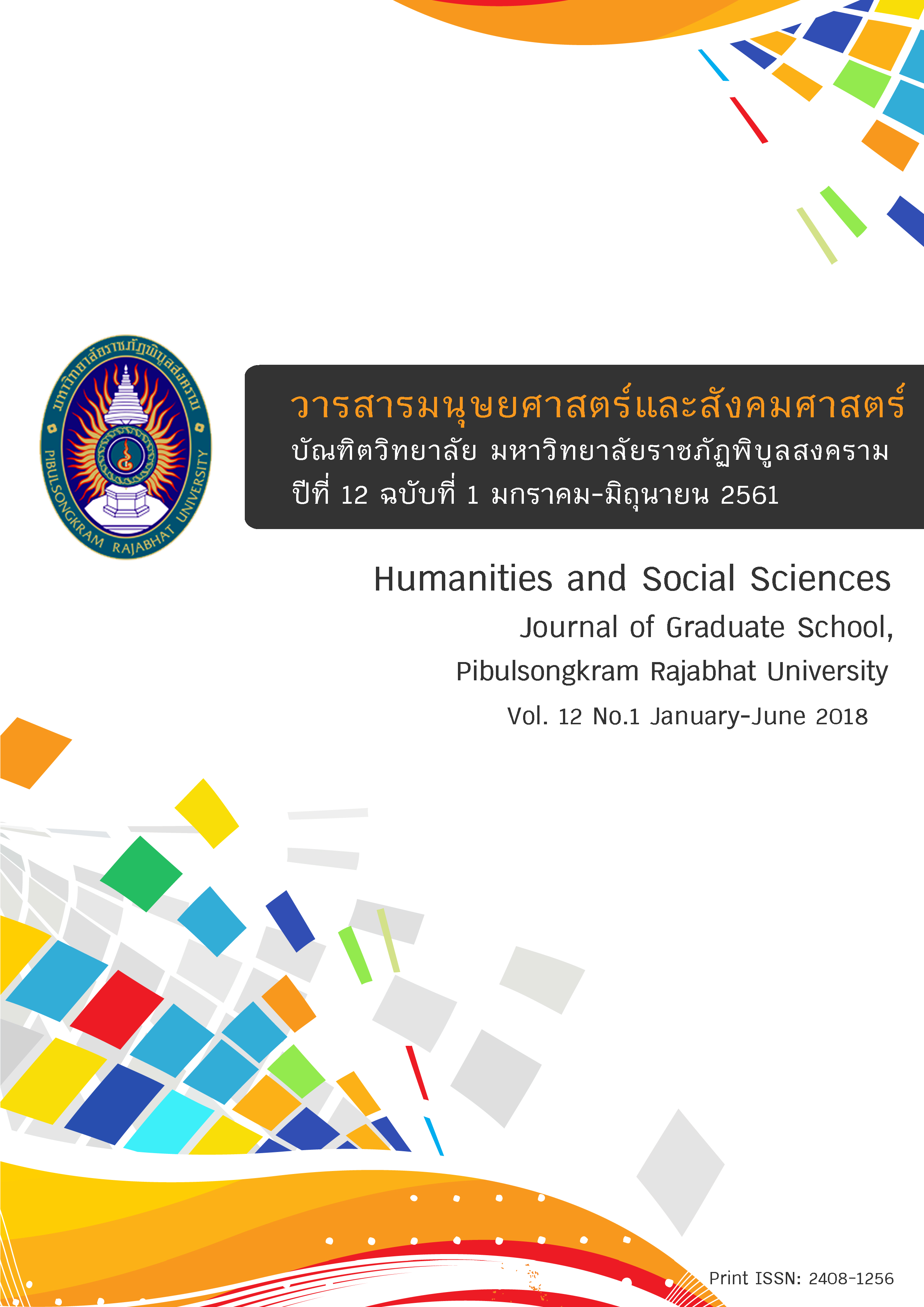The Development of the Integrated Learning Instructional Model Based on Agriculture to Develop the Agricultural Profession Skill for Up-country Secondary School Students in the Lower-Northern Part of Thailand
Keywords:
Agricultural Profession Skill, Learning Instructional Model Based on the Agricultural, Up-country Secondary School Students in The Lower-Northern Part of ThailandAbstract
The purposes of this research were 1) to investigate the context, construct and examine the learning, 2) to experiment the learning, 3) to evaluate the learning instructional model based on the agricultural profession skill of up-country secondary school students in the lower-northern Thailand. This research is divided in 3 steps. Step1: 1) Investigate the context, construct and examine the learning instructional model based on the agricultural profession skill of up-country secondary school students in the lower-northern Thailand. The population consisted of 11,631 teachers and administrators from 265 up-country secondary schools in the lower-northern Thailand. The samples were 238 teachers, administrators by stratified random sampling. The research instrument was a questionnaire on problems’ learning instruction and context. 2) Construct and develop model consisted of 5 components which were (1) factor of learning, (2) working skills, (3) team working, (4) characteristics of agriculturist, (5) inspiration to work. Data collection was conducted by structural interviewing. The samples were agricultural teachers and administrators, local philosophers and 19 successful agricultural students’ parents. The data were analyzed, interpreted, summarized, constructed and examined the model by the experts. Step 2: Implement with 36 students of Chattrakarnwittaya School in Chattrakarn distict, Phitsanulok and 40 students of Nakornthai school in Nakornthai District, Phitsanulok were a control group. The research instruments were 1) the achievement test of learning, 2) student’s agricultural skills questionnaire, 3) satisfaction assessment. The data were analyzed by using mean and t-test. Step 3: Evaluate the developed model by 5 experts with 4 standards: utility, propriety, feasibility and accuracy. Research findings were as follows:
- 1. The results from the study of the context, constructing and investigating found that
1.1 The study of the context overall was performed at a high level, the state of agricultural learning instruction was performed at a moderate level, the learning instructional model based on the agricultural profession skill was performed at a low level. Achievement of the learning instruction based on the agricultural profession skill was performed at a moderate level and essential agricultural profession skill was performed at moderate level.
1.2 The model and indicators of each composition were as follows: 1) some classroom management indicators were the context and external environment, internal classroom environment, local wisdom, curriculum and Project- based learning, 2) skill indicators for working were ability and willingness to work, research, problem solving, interacting and technology, 3) team work indicators were having the same goals/aims, division of labor and specialization, working process, team interaction, and motivation, 4) agriculturist characteristics indicators were researching, being patient, being reasonable, being responsible, and having a good attitude to work, preserving traditions, 5) inspirational indicators were willingness to work, being motivated, trophy repayment, satisfaction and profit operated by Plan, Do, Check, Act: PDCA cycle. The experts’ opinions towards suitability and accuracy of components of the model showed that overall components were at the highest level. 2. The results of the implementation model were found that the achievement and agricultural professional skill of the students learned with developed model and students learned with traditional learning model were significant difference at level of .01. 3. The evaluation of model results were as follows: students’ satisfactions of the experimental group in Learning with the developed model were at the high level. Teachers and administrators were satisfied with the complemented model at the highest level and experts’ opinions on propriety, feasibility, utility and accuracy standards of the developed model were at the highest level.
References
นันทวุฒิ มูลแสง. (2558). การพัฒนาทักษะการทำงานเป็นทีมด้วยบทเรียนบนเว็บที่ใช้วัฏจักรการสืบเสาะหาความรู้วิชาการเขียนโปรแกรมภาษาซี สำหรับนักเรียนชั้นมัธยมศึกษาปีที่ 4. (วิทยานิพนธ์ครุศาสตรมหาบัณฑิต). มหาวิทยาลัยราชภัฏมหาสารคาม, มหาสารคาม.
ปริญญา อันภักดี. (2558). การพัฒนาทักษะการทำงานเป็นทีมโดยจัดการเรียนรู้แบบโครงงานเป็นฐานผ่านสื่อสังคมออนไลน์วิชา IPST-MicroBOX ของนักเรียนชั้นมัธยมศึกษาปีที่ 2 โรงเรียนชุมแพศึกษา. (วิทยานิพนธ์ครุศาสตรมหาบัณฑิต). มหาวิทยาลัยราชภัฏมหาสารคาม, มหาสารคาม.
ปรีชา เนาว์เย็นผล. (2553). เอกสารประกอบการฝึกอบรมหลักสูตรการเขียนและวิเคราะห์ข้อสอบวัดผลสัมฤทธิ์มหาวิทยาลัยสุโขทัยธรรมาธิราช. นนทบุรี: สำนักพิมพ์มหาวิทยาลัยสุโขทัยธรรมาธิราช.
วิชัย วงษ์ใหญ่. (2554). นวัตกรรมหลักสูตรและการเรียนรู้สู่ความเป็นพลเมือง. กรุงเทพฯ: อาร์ แอนด์ ปริ้น.
สำนักงานส่งเสริมสังคมแห่งการเรียนรู้และพัฒนาคุณภาพเยาวชน. (2557). อภิวัฒน์การเรียนรู้สู่จุดเปลี่ยนประเทศไทย. วันที่ 6-8 พฤษภาคม 2557.
อนันต์ ระงับทุกข์. (2557, 23 ตุลาคม). ศธ.ยอมรับเด็กไทยทักษะคิดวิเคราะห์ต่ำ. เดลินิวส์, น. 8.
เอมอร อังสุรัตน์. (2556). การวิจัยเชิงบูรณาการในงานส่งเสริมการเกษตร. กรุงเทพฯ: สำนักพิมพ์มหาวิทยาลัยเกษตรศาสตร์.
Blishen, E. (2013). Affective Characteristics and Teaching Skills of English Language Teachers: Comparing Perceptions of Elementary, Secondary and High School Students. Creative Education, 4(2), 7.
Bruner, J. (1976). The Process of Education: Revised Edition. Cambridge, Mass: Harvard University Press.
Davies, I. K. (1971). Competency based learning: Technology, management, and design. New York & London: McGraw-Hill.
Dewey, J. (1909). Moral Principle in education. Boston: Houghton Mifflin Co.
Georgeanne, A. M., Kimle, K. L. & Orazem, P. (2011). Higher Education and agricultural careers: the relative importance of and returns to an agricultural major, 2011 Annual Meeting, July 24-26, 2011, Pittsburgh, Pennsylvania 103658, Agricultural and Applied Economics Association.
Georgeanne, A. M., Kevin, K. & Orazem, P. (2014). Does the Jack of all trades hold the winning hand?: comparing the role of specialized versus general skills in the returns to an agricultural degree. American Journal of Agricultural Economics, 96(1), 193.
Kolb, D. A. (1984). Experiential learning: Experience as the source of learning and development. Englewood Cliffs, NJ: Prentice-Hall
Rogers, C. R. (1969). Freedom to Learn. Columbus, Ohio: Charles E. Merril Publishing Co.
Downloads
Published
How to Cite
Issue
Section
License
Any articles or comments appearing in the Journal of Humanities and Social Sciences, Rajabhat Phibulsongkram University, are the intellectual property of the authors, and do not necessarily reflect the views of the editorial board. Published articles are copyrighted by the Journal of Humanities and Social Sciences, Rajabhat Phibulsongkram University.









